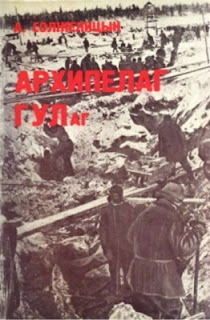 |
| Solzhenitsyn's resting place, Donskoy Monastery cemetery, Moscow |
4 years ago, Alexander Solzhenitsyn died in his native and beloved Russia. The Russian Orthodox Church reported on Aug. 3 that:
On August 3, 2012, the fourth anniversary of the death of Alexander Solzhenitsyn, the Office for the Dead [Panikhida] was said at his grave in the Donskoy Monastery’s cemetery by his spiritual father, Archpriest Nikolay Chernyshev.Praying at the commemorative service were Alexander Solzhenitsyn’s relatives and friends and his admirers. Among them were the abbot of the Donskoy Monastery, Father Paramon (Golubka), and Archpriest Nikolay Balashov, vice-chairman of the Department for External Church Relations.
39 years ago, also in the month of August, Elizabeth Voronyanskaya, 66, was detained by the Soviet secret police in the Leningrad Station, Moscow. The aged woman would be put under great ordeal, and forced to hand the typed draft of what many consider the greatest book of the 20th century, The Gulag Archipelago. Days later, Voronyaskaya would be found dead in her house, in what was called a "suicide" by authorities, but under extremely suspicious circumstances.
The small circle of the "Invisibles", that had been assembled by Solzhenitsyn following the great success of his first widely published work, One Day in the Life of Ivan Denisovich, had acted with loyalty and courage. This small group was made of people who died, were arrested, beaten, tortured, and exiled, all to make the truth of Communism known to the world. By the time of Voronyanskaya's death, the work was already safely outside Russia - but her arrest, forced confession and death moved Solzhenitsyn to the extreme measure of asking for the urgent publication of the Russian original and for translations to be made as soon as possible.
A small group was able to do from inside the Soviet empire what the Council could not bring itself to do in Rome a few years earlier. By its shameful silence on the gravest moral matter of its age, the Council condemned itself. Thousands and thousands of words, and the greatest elephant in the room remained unmentioned by name, even though the Church had not refrained from naming it since the 19th century, and even in moments of intense persecution. May the struggle of the victims of Communism live forever through the witness of those who stood up to it when they had the chance - and those who still stand up to it today.
In order to understand exactly how Solzhenitsyn and the "Invisibles" managed to get The Gulag Archipelago published, we recommend this remarkable 50-minute documentary, which has just come to our attention.
